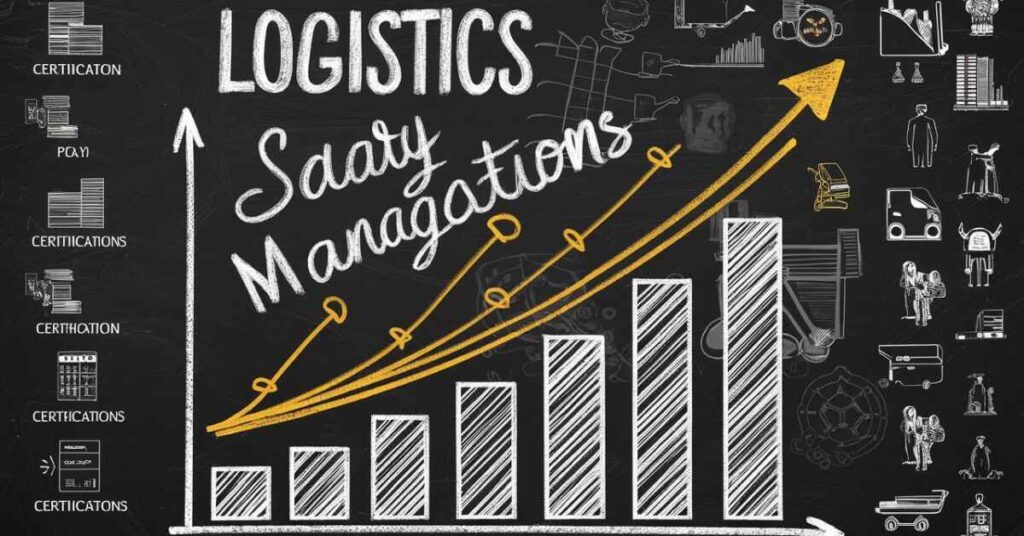In today’s fast-paced global economy, logistics executives play a critical role in observing businesses in a row smoothly. From bringing together supply chains to enhancing transportation paths, these specialists ensure that products and materials flow proficiently from point A to point B.
But what kind of reward can you expect in this active field? Let’s dive into the world of logistics manager salaries, discovering the factors that stimulus pay, industry drifts, and policies for boosting you’re earnings.
What Does a Logistics Manager Do?
Before the critical situation is the numbers, let’s break down the core farm duties of a logistics manager. These specialists are the intelligence behind the scenes, stage-managing the complex dance of supply chain management. Their day-to-day tasks often include:
- Overseeing inventory management
- Coordinating transportation and distribution
- Negotiating with suppliers and carriers
- Implementing cost-saving measures
- Analyzing data to improve efficiency
- Managing a team of logistics specialists
To excel in this part, logistics managers need a unique merger of skills. They must be logical philosophers, adept at using data and spreadsheets to make up-to-date decisions. Strong communication services are vital for coordinating with numerous stakeholders. Problem-solving abilities come in within reach when unanticipated issues arise, as they often do in the domain of logistics.
Factors Influencing Logistics Manager Salaries
When it moves toward logistics director salaries, one size doesn’t suitable all. Numerous key factors can considerably impact your receiving perspective:

- Experience: As with many careers, your years in the field play a critical role in defining your salary. Entry-level logistics executives typically earn a smaller amount than their seasoned complements.
- Education: While a confirmed bachelor’s degree is often the smallest requirement, those with progressive degrees or specialized qualifications may command higher salaries.
- Industry sector: Logistics managers in high-value activities like technology or medicines often earn more than those in wholesale or industrialized.
- Company size: Generally, larger corporations with more complex supply handcuffs offer higher pays to their logistics managers.
- Geographic location: Salaries can vary expressively based on where you work, with captain municipal areas and logistics hubs naturally offering higher pay.
- Specializations: Skill in niche areas like international logistics or cold chain management can lead to greater salaries.
Average Logistics Manager Salaries across the USA
Now, let’s talk records. According to recent data, the national regular salary for logistics directors in the USA hovers around $76,000 per year. However, this figure can vary widely based on the factors we’ve discussed. Here’s a breakdown of salary ranges for not the same career stages:
| Career Stage | Salary Range |
| Entry-level | $50,000 – $65,000 |
| Mid-career | $65,000 – $90,000 |
| Senior | $90,000 – $120,000+ |
It’s worth observing that these numbers are just averages. Top entertainers in the field, particularly those working for Fortune 500 companies or in high-cost-of-living areas, can earn well over $150,000 annually.
Industry-Specific Logistics Manager Salaries
The industry you work in can have a substantial impact on your earnings. Here’s a closer look at regular salaries in some key sectors:
- E-commerce: With the flourishing of online shopping, e-commerce logistics executives are in high request. Salaries in this segment often range from $70,000 to $110,000, with the possibility for higher earnings at major companies like Amazon or Walmart.
- Manufacturing: In the manufacturing area, logistics managers normally earn between $65,000 and $95,000. Those working in digital manufacturing or motorized industries may see salaries on the higher end of this range.
- Retail: Retail logistics executives usually earn between $60,000 and $85,000. However, those working for huge nationwide chains or luxury trademarks may command higher salaries.
- Healthcare: The healthcare industry offers modest salaries for logistics executives, often reaching from $75,000 to $105,000. The multifaceted nature of healthcare supply chains and the serious importance of timely transport contribute to these higher figures.
- Transportation and warehousing: In this sector, which forms the support of logistics processes, salaries normally range from $65,000 to $90,000. Managers’ supervision of large distribution centers or difficult-carrying networks may earn more.
Education and Certification Impact on Logistics Manager Pay
While understanding is crucial, education and credentials can give your salary an insignificant boost. Let’s explore how not the same qualifications can impression you’re earning prospective:

Bachelors vs. Master’s Degree
A bachelor’s degree in logistics, supply chain management, or a related field is often the lowest requirement for logistics manager locations. However, those with a master’s degree, such as an MBA with a focus on supply chain management, can assume to earn 10-20% more on average.
Professional Certifications
Industry certifications can determine your knowledge and lead to higher salaries. Some of the most valuable certifications include:
- APICS Certified Supply Chain Professional (CSCP): This certification can lead to a salary increase of 12-18%.
- Certified in Logistics, Transportation, and Distribution (CLTD): Holders of this certification often see a salary bump of 10-15%.
- Council of Supply Chain Management Professionals (CSCMP) SCPro™: This comprehensive certification can result in salary increases of 15-20%.
Investing in training and certifications is like turbocharging your logistics career. It’s not just about the knowledge you achieve, but the doors it opens and the sureness it gives you to negotiate better advantage. Sarah Thompson, Senior Logistics Director at a Fortune 500 company
Career Progression and Salary Growth
As you advance in your logistics career, you can expect your salary to grow significantly. Here’s a typical career progression and the associated salary ranges:
- Logistics Coordinator: $40,000 – $55,000
- Logistics Manager: $65,000 – $90,000
- Senior Logistics Manager: $90,000 – $120,000
- Director of Logistics: $120,000 – $150,000
- Vice President of Supply Chain: $150,000 – $250,000+
Remember, these statistics can vary based on dynamics like company size, industry, and location. Many logistics specialists also enjoy performance-based extras, which can significantly upsurge their total compensation.
Read this Blog: Unlocking the Power of Supply Chain Marketing
Negotiating Your Logistics Manager Salary
When it comes to acquiring the best possible salary, homework is key. Here are some tips to help you negotiate effectively:
- Do your research: Use salary appraisal tools and industry reports to realize the going rate for your situation in your area.
- Highlight your unique value proposition: Emphasize particular achievements, such as cost savings you’ve employed or efficiency perfections you’ve made.
- Consider the total package: Don’t focus solely on base salary. Deliberate benefits, bonuses, and chances for advancement.
- Be prepared to walk away: Know your worth and be prepared to explore other events if the offer doesn’t meet your anticipations.
Future Outlook for Logistics Manager Salaries

The future looks cheerful for logistics managers. As global supply chains become progressively complex and e-commerce continues to rise, demand for skilled logistics experts is on the rise. Industry specialists predict that logistics manager incomes will grow by 5-7% yearly over the next five years.
Developing technologies like artificial intelligence, blockchain, and the Internet of Things are redesigning the logistics landscape. Managers who stay ahead of these tendencies and develop skills in zones like data analytics and computerization will likely command higher salaries.
Case Studies: Real-Life Logistics Manager Salary Journeys
Let’s look at two anonymous profiles to illustrate how different career paths can affect logistics manager salaries:
Case Study 1: Mark’s Journey
Mark started as a logistics coordinator after college, earning $45,000. After five years and earning his CSCP certification, he became a logistics manager at a mid-sized manufacturing company, with a salary of $72,000. Ten years into his career, Mark completed an MBA and moved to a senior logistics manager role at a large e-commerce company, boosting his salary to $115,000 plus bonuses.
Case Study 2: Lisa’s Path
Lisa began her career in retail operations before transitioning to logistics. She started as a logistics analyst earning $50,000. After three years, she became a logistics manager for a healthcare company, earning $80,000. Lisa then focused on developing expertise in healthcare supply chains and earned her CLTD certification. Five years later, she’s now a senior logistics manager specializing in pharmaceutical distribution, earning $130,000 plus a substantial performance bonus.
Tips for Boosting Your Logistics Manager Salary
Want to maximize your earning potential? Consider these strategies:
- Continuous learning: Stay updated on industry styles and new savvies. Consider courses in areas like search engine optimization, latent semantic indexing, and keyword research to improve your digital supply chain information.
- Develop a specialty: Becoming a professional in a niche area, such as cold chain logistics or antithesis logistics, can make you more valuable to employers.
- Gain international experience: As supply chains become gradually global, experience with international logistics can be a significant salary promoter.
- Improve your soft skills: Enhance your governance, communication, and problem-solving talents. These skills are critical for higher-level positions.
- Network actively: Attend industry seminars, join professional connotations, and connect with peers. Networking can lead to new chances and salary growth.
- Take on challenging projects: Volunteer for high-visibility schemes that allow you to establish your skills and add worth to your organization.
- Stay data-savvy: Improve your skills in data analysis and visualization. Being able to opportunity raw data into actionable insights using charts and spreadsheets can set you apart from your peers.
Conclusion
Routing the world of logistics manager salaries can be as compound as handling a global supply chain. By accepting the factors that guide compensation, staying ahead of business trends, and continuously emerging your skills, you can position yourself for a satisfying and worthwhile career in logistics management.
Remember, your salary is just one portion of your overall career gratification. Consider features like work-life balance, business culture, and growing opportunities when estimating job offers or assigning compensation.
As the logistics industry continues to evolve, those who adjust, learn, and innovate will find themselves in high ultimatum. So, keep strident forward, stay questioning, and don’t be afraid to exchange for what you’re worth. Your skills are valued, and with the right line of attack, you can unlock a salary that reproduces your expertise and charities to the field of logistics management.


![Find a Section 8 houses for rent with no deposit Revealed! [2024]](https://busslirra.com/wp-content/uploads/2024/08/Find-a-Section-8-houses-for-rent-with-no-deposit-Revealed-2024-300x157.jpg)







![Find a Section 8 houses for rent with no deposit Revealed! [2024]](https://busslirra.com/wp-content/uploads/2024/08/Find-a-Section-8-houses-for-rent-with-no-deposit-Revealed-2024-150x150.jpg)
